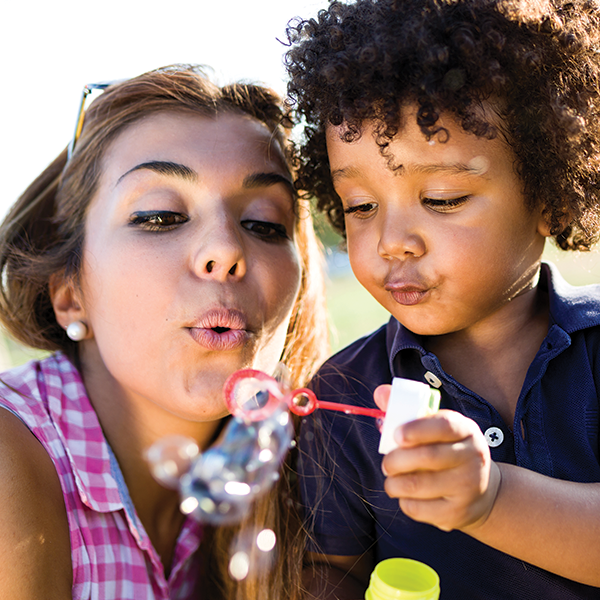Illinois’ Fiscal Year 2023 Spending Plan & What it Means for Infants & Toddlers
Raising Illinois applauds the Illinois General Assembly for approving meaningful, new education and care funding and measures in Fiscal Year 2023 for services that benefit infants, toddlers and those who care for them.
The Illinois General Assembly approved the state’s Fiscal Year 2023 (FY 2023) spending plan early Saturday morning. We expect Governor J.B. Pritzker will sign the package into law in the coming days. The final budget (HB 900) includes a welcomed increase of $54.4 million (10% increase) in state funding for preschool, evidence-based home visiting services and center-based infant-toddler programs – all funded by the Early Childhood Block Grant (ECBG) at the Illinois State Board of Education (ISBE).
It also includes $7 million (6.4% increase) in additional funding for the Early Intervention program, restoring last year’s funding cut, and appropriated $1 million (6% increase) in new funding for Illinois’ Department of Human Services’ home visiting programs, the first funding increase of such programs in nearly 20 years.
In addition, several critical changes to Medicaid reimbursement rates, including an additional $25 million for obstetrician care - bringing prenatal rates in line with adult well-visit reimbursements (total of $35 million) - an additional $170 million for mental health and substance use services and $10 million for dental care.
Find a more robust outline of budget line items and important legislative measures that impact infants, toddlers and those who care for them below. Note these lists are not comprehensive.
Raising Illinois knows that by investing early, we can lay the foundation for all Illinois children to have a strong start in school and life. But, to get it right, we must also address the root causes of historic disparities and create an equitable and cohesive early childhood development system for Illinois’ expecting families, infants and toddlers, and the communities in which they live. We applaud the hard work of advocates and the commitment of Governor Pritzker and the Illinois General Assembly this spring, as this latest budget clearly recognizes the need to prioritize families across the state.
Although there is far more work to do, Raising Illinois members are proud of the positive change and successful advocacy efforts this spring. We look forward to continue working with one another toward expanding families’ access to more affordable and equitable high-quality learning experiences, health services and economic supports as outlined in the Illinois Prenatal to Three Agenda. Together, we can make a powerful commitment to our youngest generation, because infants and toddlers only get one chance at a strong start.
State funding that impacts infants and toddlers in the FY 2023 budget includes:
- A $54 million (10%) increase in state funding for the Early Childhood Block Grant at the Illinois State Board of Education (home visiting and center-based)
- A $536,000 (5.3%) increase in state funding for Maternal Child Home Visiting (formerly Parents Too Soon) at IDHS
- A $480,000 (7%) increase in state funding for Healthy Families Illinois home visiting at IDHS
- A restoration of state funding, $7 million (6.4%), for the Early Intervention (EI) program at IDHS
- Level-funding (0.0%) for the Child Care Assistance Program (CCAP) at IDHS, though the administration has already committed to increase provider reimbursement rates twice over the next fiscal year.
- A new $2.5 million appropriation for the Illinois Higher Education Savings Program (i.e., Children’s Savings Accounts) to improve childhood outcomes and promote equitable access to higher education
- A new $2 million appropriation to IDHS for deposit into the Off-Hours Child Care Program Fund
Several other important measures impacting the infants and toddlers have been approved by the legislature, including:
- SB 157 (Hastings, Zalewski) amends the Illinois Income Tax Act to:
- Expand eligibility of Illinois’ Earned Income Credit (EIC) by permanently including nearly 1 million Illinoisans who are currently excluded from the refund—namely, childless workers ages 18-24 and over age 65, as well as immigrants who file taxes with an Individual Taxpayer Identification Number.
- Provide an income boost to the existing 3.6 million EIC recipients by increasing the credit amount from the current 18% to a 20% match of the federal Earned Income Tax Credit.
- Offer cash relief for most Illinois families at the value of $50 per individual plus $100 each for up to three child dependents.
- SB 3991 launches the Illinois higher Education Savings Program (i.e., Children’s Savings Accounts), which will help ensure equitable access to higher education, reduce caregiver depression and support a continuum of educational opportunity.
- HB 4242 (Collins, Morrison) amends the Children and Family Services Act to:
- Extend automatic eligibility to CCAP for parenting youth in care and families on the DCFS Extend Family Support Program.
- Extend automatic eligibility to EI for infants and toddlers in the child welfare system.
- Require DCFS to pay child care providers the same reimbursement rates IDHS pays its providers through the CCAP program.
- Require DCFS to report data on its child care program.
- HB 4999 (Gabel, Villanueva) codifies into state law the timeline (30 days) by which services for families in the EI program must be initiated after a service plan has been approved.
- HB 1571 (Manley, Glowiak Hilton) creates the Off-Hours Child Care Program at IDHS to help first responders and other workers identify and access off-hours child care.
- SB 3149 (Villanueva, Guzzardi) requires the Illinois Student Assistance Commission and higher education institutions to provide information about the Child Care Assistance Program and federal dependent care to students eligible for Monetary Award Program grants.
- HB 5525 creates the Commission on Children of Incarcerated Parents within IDHS.
